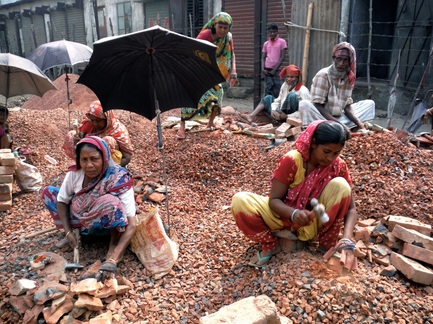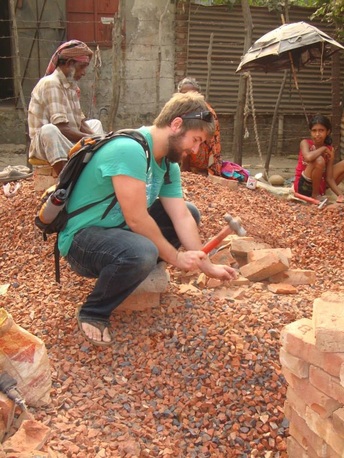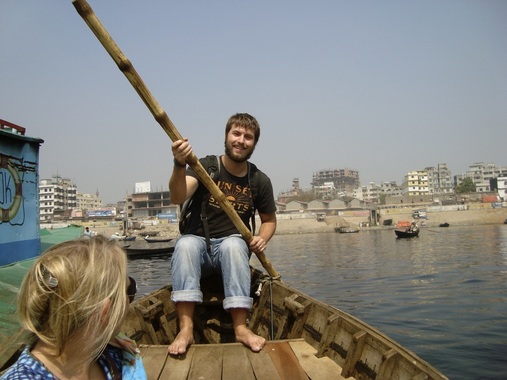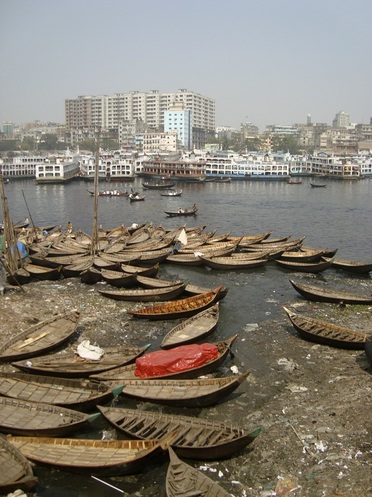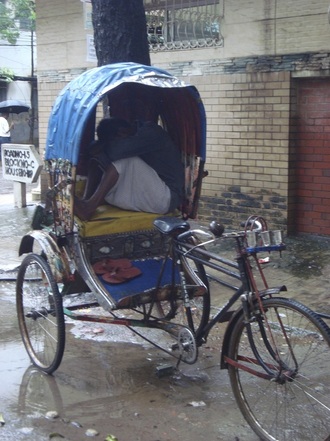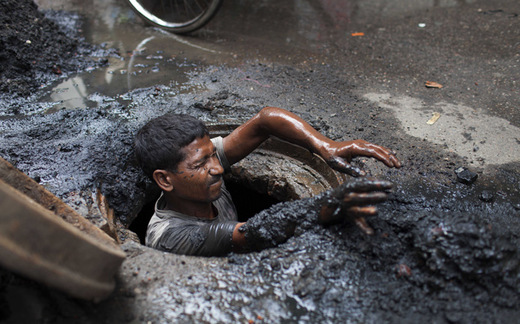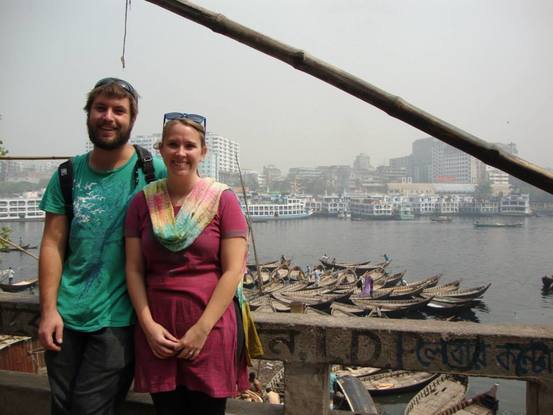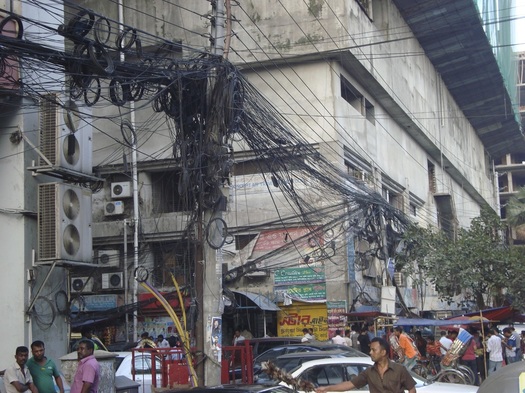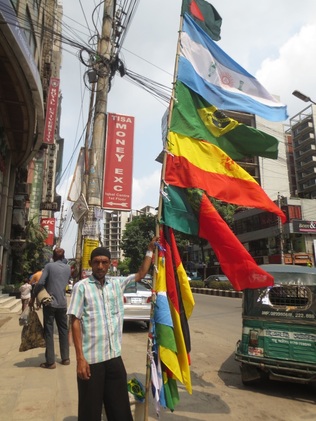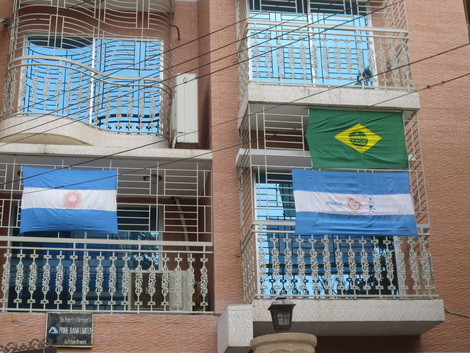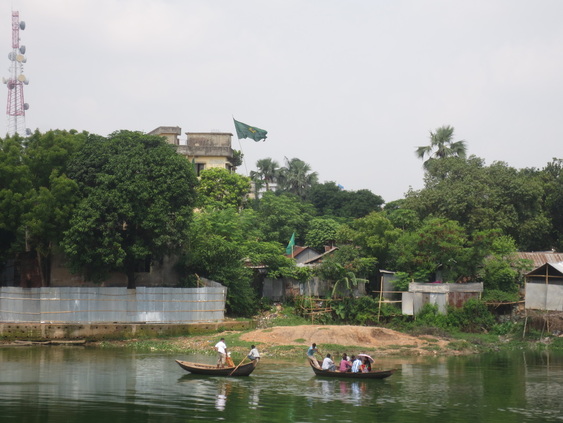|
I wrote this about two years ago, a few weeks after the event in question happened and I decided not to share it at the time. This still stands out as one of the sharpest memories I have of Bangladesh. While many memories have started to fade or turn hazy, this one hasn't and I'm not sure it ever will.
In late April the humidity that had building for weeks finally released a torrential downpour marking the beginning the mango rains. I was drenched with a fetid mixture of sweat, rainwater and mud sprayed by passing cars as I pedaled home on my bicycle. Oblivious to the conditions as I weaved through the traffic, I reviewed the animated class-discussion my grade nine students had earlier that day as we read Night, a powerful Holocaust memoir, by Elie Wiesel. The author’s assertion that to “remain silent and indifferent is the greatest sin of all” had provoked a lively conversation about the inequality ingrained in Bangladeshi society and the importance of our personal responsibility to intervene and actively seek justice for those in need. I was stoked to hear my students coming to these conclusions on their own and began mentally scripting some questions to flesh out these ideas a bit more the next day. A particularly loud chorus of bellowing car horns interrupted my idealistic teacher-thoughts and I slowed as I approached a crossroads that seemed to be the source of a major traffic jam. As I slowly maneuvered my bicycle between grumbling cars and snarling CNGs, I soon stumbled across the cause of the disruption. A rickshaw wallah had, apparently, nicked a policeman’s leg with his wheel and was suffering the consequences. He was on his back. His arms wriggling in an unsuccessful attempt to shield his bloody face from a relentless torrent of angry blows. He writhed in the muck as a lone policemen clothed in moldy-green viciously stomped on his torso and beat his contorted face with a weathered, well-used baton. Any cries that escaped the wallah’s swollen lips were swallowed by the relentless drumming of the rain. Passengers on the surrounding rickshaws looked on dispassionately, observing the events through a veil of merciless rainwater. All wore an expression of indifference, even boredom, on their faces. A second traffic policeman peeked apathetically out from under the comfort of his umbrella; his black eyes reflecting the cold car lights that illuminated the pitiful spectacle for all to witness. I silently watched the beating for what was probably a whole minute; it seemed to last forever. I said nothing. I did nothing. Suddenly, the officer stopped and, giving the wallah one final kick, left him curled up like a cockroach crushed on the side of the road. I thought he was dead. After a few excruciating seconds, the wallah slowly rolled over and, panting heavily, pushed himself off of the filthy street. Through sheets of rain, I could make out his smashed nose, purple, swollen face and toothless mouth filled with pulpy, foaming blood that dribbled all the way down his shirt onto the ground. For a split second, I stared into the hollow eyes that had meekly accepted the beating. With quivering hands, he re-tied his blood-soaked lungi, hobbled back to his rickshaw and pedaled painfully away. Car-engines that had been extinguished to conserve fuel roared to life and rickshaws rang their bells and jostled for position as the incident was quickly forgotten and the traffic flow returned to normal. The policeman’s whistle pierced the air and he waved me onward. I was whisked straight through the crimson smear in the muddy road by a relentless flow of cars, CNGs and rickshaws. As I pedaled my muddy tires passed through the puddle of red sludge and teeth, I was already trying to justify my inaction. “It would have been dangerous” I thought desperately to myself. “I would have gotten myself into trouble. This happens all the time so there would be no point in trying to stop it. I can’t speak fluent Bangla. They wouldn’t have understood me…” My excuses felt, and still feel, so inadequate. The falling rain masked the hot tears that streamed down my face.
0 Comments
People love complaining. Humanity seems to suffer from an irresistible urge to gripe about everything and anything. As a high-school teacher, I have the tendency to balk at ever-growing mountains of papers, grumble about lessons I must plan each night and grouse about meetings I’m required to attend. Ohhh the meetings! Don’t ever get me started on that rant! While I still indulge in the occasional bitching-session at work, one of the perspectives that living and working overseas has given me is the knowledge that I have it easy. Whenever I begin complaining about my job (or hear others griping about theirs), my mind inevitably wanders to Dhaka. While I may grow tired of grading stacks of papers or lesson-planning, I can never forget several groups of people I watched at work in Dhaka and the lessons I learned from observing them. Brick-Breakers In front of new construction sites, small armies of women, children and older men gather to smash bricks with hammers. The brick-shards are used as fill or for mixing concrete. The brick-breakers wear no protection except for worn, leather finger-guards and, if you look closely, you can tell than many of their fingers are broken or flecked with spots of blood. They don’t normally speak, laugh or sing. The methodical clink, clink, clink of their hammers is the only sound announcing their presence. I sat with some brick-breakers and worked with them on a couple of occasions. It is amazing how tiring the job is…I was outworked once by a wiry 70-year old women and my arm felt like it was about to fall off after 15 minutes! Most brick-breakers work from dawn to dusk regardless of the heat or rain and are granted few breaks; many of them sleep on the construction site. They live a brutal existence. One evening, when I was feeling overwhelmed by the pile of essays I needed to grade, I looked out my bedroom window across the street where three brick-breakers had just started on a new load of bricks around 7:00PM and suddenly felt thankful for the opportunity to grade papers. Sampan Ferrymen A central part of any trip into Old Dhaka is a journey on the Buriganga River on one of the small sampan ferries used by locals to get across the river. There is no better way to see the chaos and grit of Dhaka up close, but I always pitied the boatmen jostling for customers on the river-banks. Most have recently moved to the city so many of them live in their boats and work around the clock. They bathe in the fetid water of the river. They risk being crushed by larger vessels who will not stop; apparently, a few boats are sunk each day on the river and dozens of boatmen and customers drown each year. I chose to be a teacher and I could quit and find a new career if I wanted a change of pace. These guys have few options. They are illiterate farmers who moved to Dhaka to escape a life of grinding rural poverty, only to become trapped in a megacity-nightmare that is even worse. Most Westerners have options. We can change jobs if we wish without the fear that our families will starve. Whenever thoughts of how tough my job is creep into my mind, I try to remind myself that I chose this career path and I have the freedom to change my occupation if I want. Not everyone is so lucky. Rickshaw Wallahs According to some estimates, around 600,000 men in Dhaka are employed as rickshaw wallahs, making it one of the most common means of employment in the city. I do not envy their jobs. Rickshaw wallahs pedal costumers all day long in the scorching sun and blinding rain and are paid pennies for the labor. They rarely own their rickshaw, so the bulk of their daily earnings are paid to the owners who lends their fleet out. One time, when I was alone on the back of a rickshaw in a torrential downpour, I watched my rain-soaked wallah strain his skinny legs to pull me through the flooded streets. He was coughing and obviously sick with some sort of lung infection and I remember thinking “this is the saddest thing I’ve ever seen.” I paid him double what I owed but felt guilty that I literally earned more in a single day than he would in several months. I may not be the richest man in the world, but I am paid enough that I have a comfortable life. I need to remember that perspective from time to time! Sewer-Workers Finally (and this job takes the cake), I vividly remember the sewer backing up a block away from our apartment during a rainstorm. This isn’t uncommon in Dhaka; I was used to dodging unspeakable things floating around our streets after heavy rain. What was different was that, this time, a Dhaka City Corporation crew appeared to actually be preparing to fix the problem. This level of efficiency (and by efficiency I mean something, anything being done) intrigued me and I pulled my bike to the side of the road to observe them. I watched as a boy, who looked to be around thirteen or fourteen, stripped to his shorts, wrapped a rag around his mouth, and gingerly lowered himself into a manhole hidden by sludge. He took a deep breath and disappeared into the muck and sewage. He was under for about thirty seconds and he came up sputtering with some soggy wreckage in hand. He chucked it into the street, took another deep breath and dove again. He repeated the process about ten times before I pedalled away on my bicycle. The image of the boy, younger than many of my students, plunging repeatedly into a fetid morass of black muck will stick with me forever. So you think your high-school job at MacDonald’s or shovelling gravel was tough? At least you didn’t have to swim naked in pools of sewage! Living in Dhaka taught me to be thankful for the wonderful jobs that I have held throughout my life. I’ve worked hard. I’ve shovelled gravel, hefted 80-pound bricks, sweated away my Saturday nights in a kitchen and spent hours sifting through horribly written essays and assignments from my students. But when I remember the people of Dhaka, I'm reminded of how grateful I am for all of it.
The first week we arrived in Bangladesh, a friend told me “you may cry when you land in Dhaka but you’ll cry harder when you leave.” For us, his comment was prophetic. In 2012, Danielle and I received job offers from two international schools, one in Dhaka and one in Kabul. We chose (wisely I think) to move to Dhaka completely ignorant of what we were getting ourselves into. I knew Bangladesh was east of India and that Dhaka was an impoverished, densely packed city but I naively believed my previous experience in South-East Asia, Latin America and the Middle East had prepared me for anything the developing world could throw at me. As I enthusiastically planned lessons for school, said my goodbyes and packed for the move, I was oblivious to what awaited me. Arriving in Dhaka was a smack in the face. I wasn’t prepared for the sheer wall of humidity and humanity that awaited me. The traffic was worse than my wildest nightmares; the constant auditory barrage of horns and Bengali-screams was disorienting and the garbage-strewn roads and open sewers added an overpowering stench to the mix. Danielle and I were chased by aggressive packs of beggars as we wandered our neighborhood, assaulted by mosquitoes at night and struggled to find simple things like grocery stores or ATMs in the congested maze of Dhaka’s streets. I was utterly and entirely overwhelmed. Our first few days were filled with tears of frustration, stress and an intense feeling of helplessness. Instead of the fun-filled adventure we anticipated, we feared that Dhaka would end up being the worst decision of our lives. Over the next several months however, Dhaka slowly began to grow on us. As we learned our way around the city, made close friends and finally received air conditioning for our apartment, we began to feel at home. Some things continued to drive us into occasional rampaging sessions of anger (commonly classified as “Dhaka Rage” amongst expats) but Dhaka didn’t seem half as bad as when we first arrived. Dani and I learned to love eating burn-your-face-off biryani with our hands, sipping sweet chaa from chipped glasses at tea stalls and gorging ourselves on aloo chaat. We learned to appreciate the warm smiles, friendliness and genuine curiosity of the Bengali people, even if it was overwhelming and invasive at times. We perched at our windows like excited children during thunderstorms, eagerly waiting for the next bolt of lightning to strike. We learned to cling for dear life with a strange mix of glee and terror as our rickshaw wallah expertly weaved in and out of traffic, missing incoming buses by mere inches. We learned to enjoy the riotous colours of the shalwar kameeze worn by Bengali women walking to or from work at the garment factories each morning. We learned how shut our nasal passages to the smells of the garbage heaps, dead animals and open sewers...and continue breathing! EVERYTHING about Dhaka was different but it became familiar. Bangladesh became home. And then we had to leave. Job opportunities elsewhere pulled us away but as the plane lifted off and I watched the shabby grey buildings and green fields disappear under the clouds for the last time, a tear or two…may have rolled down my cheek.
When Danielle and I think back on Dhaka, the frustrations and fears of our first few months fade into the background. What stands out for us more and more as the weeks and months go by is the friends we made, the colourful experiences we had and the fact that we managed to face and conquer the challenges of Bangladesh together. Tom Stoppard, one of my favorite playwrights, wrote in one of his absurdist dramas that “every exit is an entry somewhere else.” That rings true for me now. We left Dhaka for a new adventure in Asuncion. Who knows where we’ll end up next? Whenever Danielle and I move to a new country, we will fondly remember the first-time challenges of Dhaka. We may have cried when we arrived but we also cried when we left. The FIFA World Cup in Brazil is now in full swing and halfway around the world, the tiny South-Asian country of Bangladesh is wildly excited. Bangladesh is not particularly renowned for its football prowess. Although they have participated in every FIFA qualifier round, they have never made it past the first match. The biggest win ever for the national team was a 2-0 victory over Bosnia and Herzogovina in 2001 and Bangladesh has met with little success since. Bangladesh's current FIFA ranking may be 167th but this has not dampened the rampant enthusiasm and hunger for football that I've seen on the streets over the past few days. Rickshaw wallahs and random people on the street have eagerly asked me which team I support (Ecuador in case you're interested) and hawkers push cheap flags and football jerseys at me whenever I step foot into a market. Tea-stall customers gesticulate wildly as they discuss the strengths and weaknesses of different teams as they watch previous matches on dusty, crackling TV screens. The aforementioned cheaply sewn (and inaccurate) Spanish, Brazilian, Argentine and English flags have spread rapidly across the city. From car hoods, to rickshaws, luxurious high-rises to slum shacks, the flags of FIFA teams are everywhere.
Brazil and Argentina are clearly the two major favourites; the forest-green of Brazil and white, gold and blue of Argentina have become ubiquitous. It seems that wherever my eyes wander, I find a South American flag waving gently at me. Every construction site, every apartment building and every roadside, bristles in a competition to see which fan-base can produce the most flags. I did not expect the World Cup to be so popular in such a cricket-crazy nation. It also seems particularly random that South American countries are the fan favorites rather than European ones. At the end of the day, I simply find it ironic to know that there are probably more Argentina fans in Bangladesh than there are in Argentina. Bangladesh is a country with overwhelming needs. Everywhere I look I see beggars with hollow eyes pleading for baksheesh or yet another outrageously skinny laborer slaving in the baking sun. I see grinding poverty daily but often have no idea how to approach the problems. When I was taking International Development studies in university, I naively figured that grand solutions to the world's problems could be found within my lifetime. Now, having experienced life in Bangladesh, I understand that I do not and never will have any answers to the world's biggest development-puzzles. I'm not entirely sure I even know the right questions to ask. Anyways, as I was ruminating on the ideas I mentioned above, I remembered a project my students completed last year. They students created a short video that asked locals (and some expats) on the street what they would ask for if a genie granted them one wish. The results surprised me at the time but now that I've been here for a bit longer, it makes a good amount of sense...and I think that the people of Bangladesh know full well what they need. This video contains people I see/saw on a regular basis and far more expatriates than would be normal to find on the street on any given afternoon. Check it out! (By the way, I am super-proud of my students for creating this video.) Cheers! |

